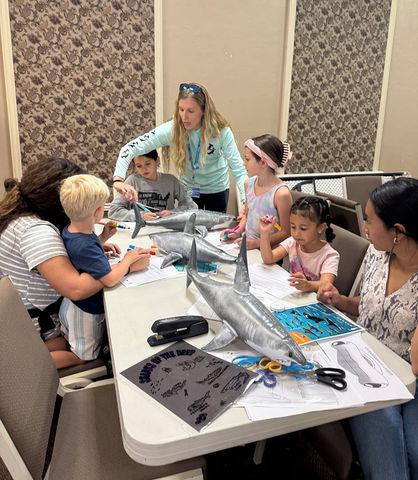Project Lemon Aid aims to establish a baseline population survey of juvenile lemon sharks at sites around the Turks and Caicos Islands to investigate whether the females return to the same mangroves where they grew up. The team is also examining habitat use, growth rates, population dynamics, and movement patterns of this species.
The first stage of this research involves tagging baby to sub-adult lemon sharks in the inshore waters, with a focus on crucial mangrove habitats. The PIT tag [similar to the one that you may tag your dog or cat with] will stay with the animal the rest of its life, and if sampled again, will reveal growth and migration around the Islands of these sharks. Additionally, genetics from a tiny fin clip on the dorsal fin of the shark will help us uncover the family trees of the lemon sharks inhabiting the area and determine how the Turks and Caicos populations are related to those in The Bahamas and Florida.
Since the project's launch in Spring 2022, we have tagged over 100 sharks. We are getting recaptures each time we return, which is exciting. The smallest shark we have tagged had a total length (TL) of 54.4 cm, and the largest had a total length (TL) of 2.03 m.
In May 2025, we added ACOUSTIC TAGS to our methodology as a means of tracking the movements of these lemon sharks once they leave the mangrove nursery. Acoustic tags, also known as acoustic transmitters, are small electronic devices used to track the movement and behavior of sharks. These tags emit unique ultrasonic pulses ("pings") that can be detected by underwater receivers positioned in the study area. Acoustic tags are beneficial for studying fine-scale movements, residency, and habitat preferences. When a tagged shark swims within range of a receiver, the receiver logs the tag’s unique ID, as well as the date and time of detection. This information is stored in the receiver until our team downloads the data. By analyzing detections from multiple receivers, we can reconstruct the shark’s movement patterns, determine how long it spends in specific areas (residency), and study its habitat use and behavior.
Partnering with Big Blue Collective has enabled us to access our study sites, as well as gain local knowledge to assist with tides and locations. This partnership has been invaluable to the success of the project.
A cornerstone of the initiative is the opportunity for students to join scientists in the field to observe juvenile lemon sharks in their natural mangrove habitats. These immersive, hands-on experiences allow students to witness scientific research in action, learn field methods, and connect academic concepts to the vibrant marine ecosystems around them. As part of this project, we have officially partnered with the Ministry of Education and the Edward C Gartland Youth Centre to provide hands-on learning opportunities for local students. They can join us on research days and participate in all aspects of the research.
Honourable Rachel Taylor, Minister of Education, praised the continued collaboration, stating, “Partnerships like these offer transformative learning opportunities for our youth. They help bridge the gap between classroom theory and real-world application, especially in the critical area of environmental stewardship.”
Jillian Morris (Founder and President of Sharks4Kids) stated, “Bringing students into the field has been incredible. They are excited and engaged, and we are changing their understanding of sharks and the ocean by providing these unique learning experiences. Getting the local community involved is critical for conservation to be successful."
The project continues to emphasize the importance of local involvement in conservation science. By including students, educators, and regional partners in both research and outreach, Project Lemon Aid ensures knowledge transfer and strengthens community stewardship of marine resources.
ALL RESEARCH DONE UNDER PERMITS FROM DECR.
Videos: Nova West
ADDITIONAL RESOURCES
SUPPORTERS
JOIN THE SHIVER!
SHIVER: Collective noun for a group of sharks.
Learn about upcoming opportunities, dive into featured species, SEA what we've been up to, and get first-access to new FREE educational resources!




























































